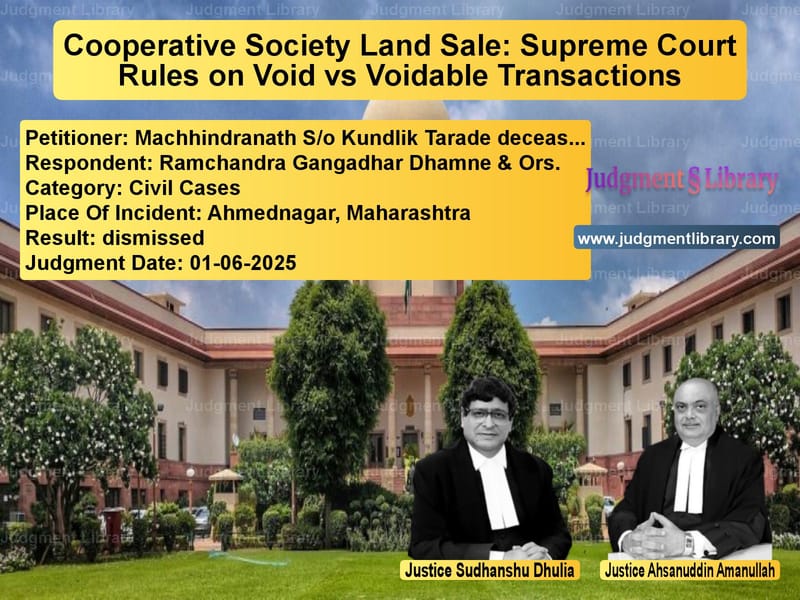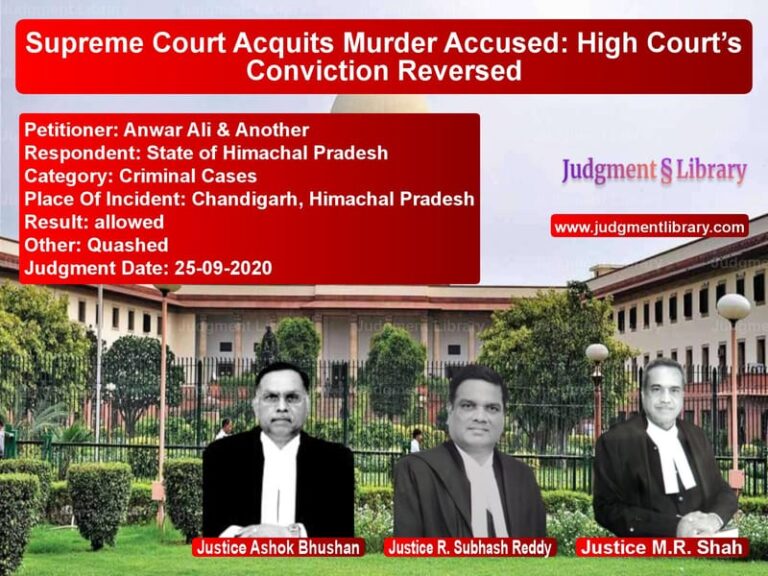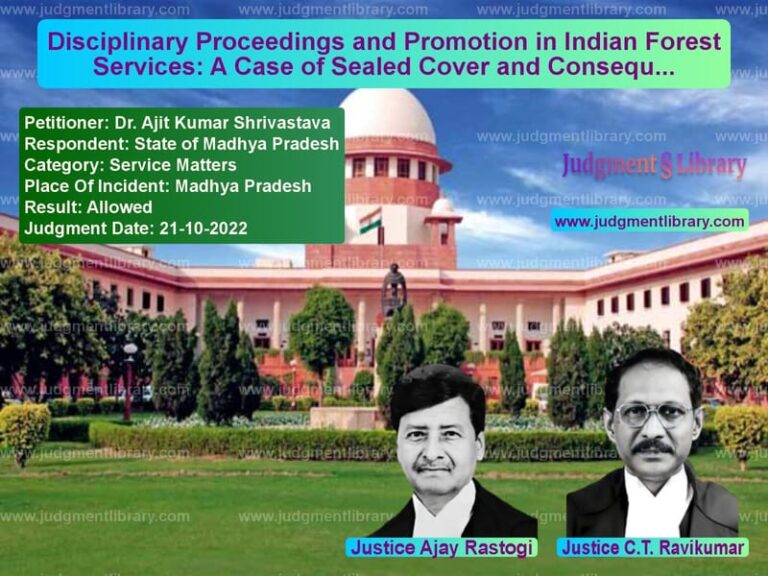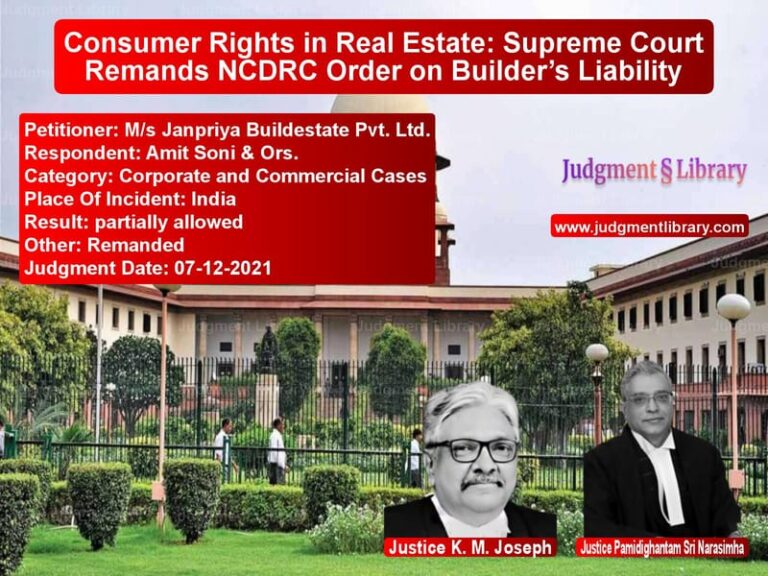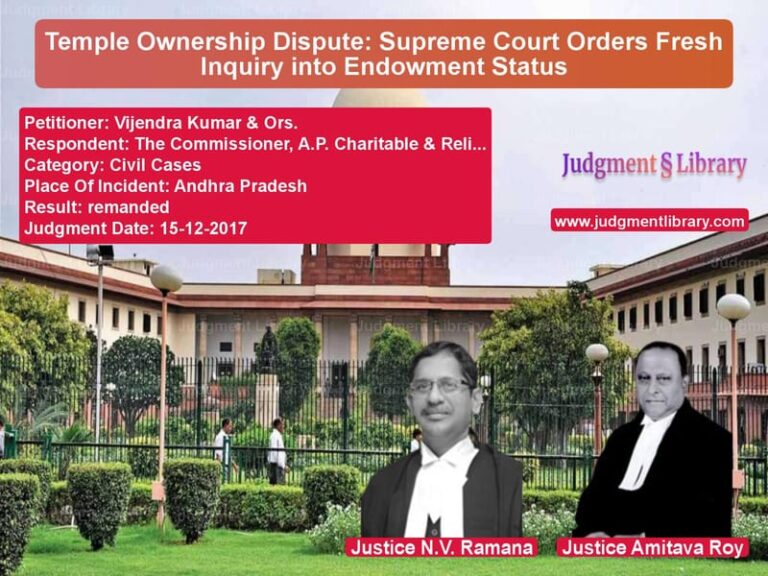Cooperative Society Land Sale: Supreme Court Rules on Void vs Voidable Transactions
In a landmark judgment that clarifies the legal distinction between void and voidable transactions in cooperative society land sales, the Supreme Court recently dismissed an appeal that had been winding through the courts for over five decades. The case involved a complex property dispute where a landowner sought to invalidate his own sale transactions by claiming they violated the Maharashtra Co-operative Societies Act. The Court’s ruling establishes important principles about when parties can benefit from their own legal violations and the rights of bona fide purchasers in property transactions involving cooperative society charges.
The Five-Decade Legal Saga
The case began in 1973 when Machhindranath Tarade filed a suit seeking to reclaim his ancestral agricultural land measuring 15 acres and 17 gunthas in Village Kendal Bk., Ahmednagar, Maharashtra. The property dispute had its origins in financial transactions dating back to the 1960s, creating a legal battle that would span generations and involve multiple rounds of litigation before finally reaching the Supreme Court in 2025.
The factual background reveals a classic family and financial drama. Machhindranath had become a member of the Kendal Bk. Vividh Karyakari Seva Sahakari Sanstha Limited in 1956 and obtained a loan from the society, creating a charge on his land. Mutation Entry no.3346 recorded this declaration on September 9, 1969. Facing financial difficulties, Machhindranath approached his nephew and son-in-law, defendant no.1, for a loan of Rs. 5,000. As security for this loan, he executed a Registered Sale Deed on November 2, 1971, transferring the suit land to defendant no.1.
On the same day, a document styled as ‘Ram Ram Patra’ (Reconveyance Deed) was executed by defendant no.1, mentioning that the total value of the suit land was around Rs. 25,000 and that he would reconvey the property upon repayment of Rs. 5,000. Mutation Entry no.3520 was recorded in defendant no.1’s name on December 24, 1971.
The plot thickened when on July 15, 1972, defendant no.1 executed a Registered Sale Deed in favor of defendant no.2 for 10 acres of the suit land for Rs. 30,000. This division created Survey No.30/1 (sold portion) and Survey No.30/2 (remaining portion). Upon learning of this sale, Machhindranath approached the Trial Court on February 28, 1973, seeking possession of both portions and directions for reconveyance.
The Legal Journey Through Courts
The Trial Court initially ruled in favor of Machhindranath in 1980, declaring the Sale Deed void under Section 48 of the Maharashtra Co-operative Societies Act and decreeing possession with directions for reconveyance. However, this was just the beginning of a long judicial process that would see the case remanded multiple times and decided differently at various levels.
The case went through First Appeals, Letters Patent Appeals, and multiple rounds of reconsideration. The learned Single Judge of the High Court initially confirmed the Trial Court’s decree but later, upon remand from a Division Bench, set aside the possession decree and dismissed the suit. The Division Bench then affirmed this decision through the impugned order dated January 15, 2019, leading to the Supreme Court appeal.
Arguments Before the Supreme Court
The appellants, representing Machhindranath’s legal heirs, presented several key arguments. They contended that “the mandate of Section 47(2) of the Act very specifically creates an embargo on transfer of land in any manner without previous sanction/permission of the Society and as per Section 47(3) of the Act, transfer made in contravention of sub-section (2) is void.” They further argued that “the charge of Society was recorded in accordance with Section 48(a) and Section 48(d) of the Act again creates an embargo from alienating the whole or any part of the land specified in the declaration submitted while creating charge under Section 48(a) and further, Section 48(e) declares such alienations in contravention of Section 48(d) as void.”
The appellants emphasized that “admittedly, the Sale Deed executed on 15.07.1972 by original defendant no.1 in favour of defendant no.2, is without any such sanction and therefore void in terms of Sections 47(3) and 48(e) of the Act.” They argued that the subsequent removal of charge by the Society’s resolution dated August 27, 1973, was inconsequential since the required permissions were necessary on the date of the Sale Deed itself.
Regarding the Sale Deed dated November 2, 1971, the appellants submitted that “same will have to be appreciated based on the surrounding circumstances which would include not only the Reconveyance Deed dated 02.11.1971 but also the act of creating charge by Mutation Entry no.3520 on 24.12.1971, which was in teeth of the declaration submitted by plaintiff in terms of Section 48(a) of the Act.”
The respondents, representing the subsequent purchasers, argued that “the plaintiff failed to prove that the sale transaction between himself and defendant no.1 was a contract or reconveyance or loan transaction.” They contended that “the plaintiff was conscious and aware about the charge of the Society and having still entered into the Sale Deed dated 02.11.1971 with defendant no.1, cannot be allowed to take the benefit of his own wrong and claim that the sale is void ab initio in terms of Sections 47 and 48 of the Act.”
They further submitted that “the defendants proved the execution of the Sale Deed dated 15.07.1972 by defendant no.1 in favour of defendant no.2 after receipt of consideration of Rs.30,000/- (Rupees Thirty Thousand). Moreover, the Sale Deed dated 15.07.1972 is a registered document and the endorsement of the Sub-Registrar shows his presence and that consideration of Rs.30,000/- (Rupees Thirty Thousand) was duly received. Hence, validity of the Sale Deed dated 15.07.1972 has been proved.”
The Supreme Court’s Legal Analysis
The Supreme Court bench comprising Justice Sudhanshu Dhulia and Justice Ahsanuddin Amanullah conducted a comprehensive analysis of the legal issues. The Court examined Section 48 of the Maharashtra Co-operative Societies Act, which creates specific protections for cooperative societies when members create charges on properties for loans.
The Court noted that “from a reading of the aforesaid provision, there is no ambiguity with regard to the import of the Section. Alienation of any such property on which a charge is created in favour of the concerned cooperative society by way of declaration is totally beyond the capacity of the owner/member who has declared it as a charged property, until the amount, for which the charge was created along with the interest, is repaid in full.”
However, the Court made a crucial distinction between void and voidable transactions, stating that “Section 48(e) of the Act which says that any alienation made in contravention of the provisions of clause (d) shall be void has to be read as directory to the extent that the same can be acted upon only at the instance of the party aggrieved (viz. the society concerned) upon whom the right has been created under the statute. In other words, with regard to a transaction, unless the society comes forward to seek its nullification/setting aside, the same would at best be a voidable action and not void ab initio.”
The Court extensively discussed the distinction between void and voidable acts, quoting from Dhurandhar Prasad Singh v Jai Prakash University: “The expressions ‘void and voidable’ have been the subject-matter of consideration before English courts times without number… The expression ‘void’ has several facets. One type of void acts, transactions, decrees are those which are wholly without jurisdiction, ab initio void and for avoiding the same no declaration is necessary, law does not take any notice of the same and it can be disregarded in collateral proceeding or otherwise.”
The Court also referenced Sindav Hari Ranchhod v Jadev Lalji Jaymal, which involved a similar provision in the Gujarat Cooperative Societies Act, where it was observed that the right to challenge alienations rests primarily with the society, not the member who committed the violation.
Critical Examination of the Reconveyance Deed
The Court conducted a detailed examination of the so-called Reconveyance Deed and found several fatal flaws. The Court noted that “this document would not be of any help to the appellants mainly because cognizance of the same cannot be taken in view of the document not being executed either on stamp paper or registered and, additionally, being in the writing of a different scribe vis-a-vis the registered Sale Deed of even date.”
The Court raised serious doubts about the authenticity of the reconveyance arrangement, observing that “it cannot be believed that a valid reconveyance deed would not specify any time-period and also not provide for any escalation in the amount to be returned in lieu of reconveyance i.e., to say that for an indefinite period the land would remain with defendant no.1, but whenever the plaintiff wants, he can ask for its reconveyance by paying merely Rs.5,000/- (Rupees Five Thousand). Besides being iniquitous, this also demonstrates that such term could not have been incorporated, if at all there was a genuine reconveyance deed.”
The Court further noted that “the plaintiff has nowhere stated that he ever approached defendant no.1 for re-conveying the suit land. The only stand taken was that he was ready to return Rs.5,000/- (Rupees Five Thousand) and that the Court may pass a decree directing reconveyance for the sum of Rs.5,000/- (Rupees Five Thousand). This itself dilutes the claim inasmuch as the cause of action would arise when the plaintiff asserted that he was ready, willing and offered to pay the amount to defendant no.1, who refused to accept such payment.”
The Principle Against Benefiting from One’s Own Wrong
A central theme in the Supreme Court’s reasoning was the legal principle that no party should benefit from their own wrong. The Court stated that “undoubtedly, the present case comes under a unique category where a person on the one hand comes before a Court seeking that his own actions be nullified on the ground that it was void and on the other hand wants relief in his favour, which is consequential to and traceable to his own wrong. It would not be proper for a Court of law to assist or aid such person who states that the wrong he committed be set aside and a relief be granted de hors the wrong committed, after condoning the same.”
The Court emphatically declared that “the plaintiff cannot be allowed to benefit from his own wrong and the Court will not be a party to a perpetuation of illegality.” Quoting from Kusheshwar Prasad Singh v State of Bihar, the Court reiterated the Latin maxim “commodum ex injuria sua nemo habere debet” (no party can take undue advantage of his own wrong).
The judgment further referenced the principle that “a wrongdoer ought not to be permitted to make a profit out of his own wrong” and that “it is settled principle of law that a man cannot be permitted to take undue and unfair advantage of his own wrong to gain favourable interpretation of law.”
Protection of Bona Fide Purchasers
The Court also addressed the rights of the subsequent purchaser, defendant no.2, stating that “defendant no.2 was a bonafide purchaser from respondent no.1/defendant no.1, on the date the Sale Deed was executed on 15.07.1972, for the reason that such transaction was made on the basis of the title which was apparent from the Sale Deed dated 02.11.1971 in favour of respondent no.1/defendant no.1. This would not have given any occasion to defendant no.2 to be cautious or under any impression, much less knowledge, that the property bought by him was encumbered on the date of purchase.”
This aspect of the judgment reinforces the importance of protecting bona fide purchasers who transact in good faith based on apparent title documents, without knowledge of underlying legal violations.
The Final Ruling and Its Implications
After comprehensive analysis, the Supreme Court dismissed the appeal, finding no merit in the arguments presented. The Court concluded that “the learned Single Judge and the Division Bench have not committed any error” in their decisions.
This judgment has significant implications for property transactions involving cooperative society charges. It clarifies that violations of statutory provisions like Section 48 of the Maharashtra Co-operative Societies Act do not automatically render transactions void ab initio, but rather voidable at the instance of the aggrieved party—in this case, the cooperative society. The ruling also strongly reinforces the principle that courts will not assist parties who seek to benefit from their own legal violations.
The decision provides important guidance on the distinction between void and voidable transactions in property law and establishes that subsequent bona fide purchasers can acquire valid title even when earlier transactions involved technical legal violations, provided they acted in good faith without knowledge of such violations. This balancing of interests between protecting cooperative societies and ensuring stability in property transactions represents a significant contribution to Indian property jurisprudence.
Petitioner Name: Machhindranath S/o Kundlik Tarade deceased through LRs.Respondent Name: Ramchandra Gangadhar Dhamne & Ors..Judgment By: Justice Sudhanshu Dhulia, Justice Ahsanuddin Amanullah.Place Of Incident: Ahmednagar, Maharashtra.Judgment Date: 01-06-2025.Result: dismissed.
Don’t miss out on the full details! Download the complete judgment in PDF format below and gain valuable insights instantly!
Download Judgment: machhindranath-so-k-vs-ramchandra-gangadhar-supreme-court-of-india-judgment-dated-01-06-2025.pdf
Directly Download Judgment: Directly download this Judgment
See all petitions in Property Disputes
See all petitions in Contract Disputes
See all petitions in Legal Malpractice
See all petitions in Judgment by Sudhanshu Dhulia
See all petitions in Judgment by Ahsanuddin Amanullah
See all petitions in dismissed
See all petitions in supreme court of India judgments June 2025
See all petitions in 2025 judgments
See all posts in Civil Cases Category
See all allowed petitions in Civil Cases Category
See all Dismissed petitions in Civil Cases Category
See all partially allowed petitions in Civil Cases Category

